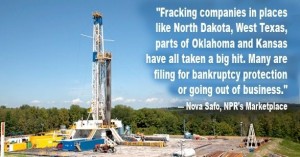From Allied News, Grove City, PA, June 28, 2018
On Saturday, June 2, Marcellus Outreach Butler hosted a presentation by John Detwiler titled “The Financial Threat to Fracking” at the Butler Library.
John, a registered professional engineer, has worked as a business executive and strategic consultant for the natural gas and electric utility industries, and is a former faculty member of Carnegie Mellon University.
His presentation focused on how the fracking industry is slowly driving itself out of business with its reckless habits and exorbitant spending. Using actual data taken from the websites of Range Resources, EQT, and other drilling companies, John laid out the precarious situation that the fracking industry is in, and how its collapse could leave us worse off.
John’s program came in the wake of a hot topic in Butler County: Rex Energy’s recent filing for Chapter 11 bankruptcy.
Many in the area are wondering what will happen if Rex ultimately folds, and if their situation is unique, or emblematic of the entire fracking industry. During the program, it seemed increasingly clear that Rex is not a unique case.
The fracking industry as a whole is in a very precarious financial situation. Driven by an insatiable need for capital investment, these companies keep soliciting loans from lenders, driving themselves deeper into debt.
The process of constructing a well pad and drilling the wells costs several million dollars, and most of that money is acquired from lenders and investors.
Now that the initial gas boom of 2008-2012 flooded the market with a glut of natural gas and drove down prices, many companies are struggling to make sufficient money off new wells to pay back their investors.
Not only has the price of natural gas declined, but production has as well. Unlike other formations, production levels in the Marcellus Shale decline rapidly after the well is drilled.
According to John, the production of an average Marcellus well declines by 50 percent in only four months, and can drop to as low as ten percent of initial production in as little as two years. Due to this downturn, the national active drilling rig count has declined from 1,600 in January 2009 to less than 200 in January 2018, and now much of the gas and its liquid by-products like butane and ethane extracted in our area are destined for export to Europe and Asia.
Are the gas industry’s financial hardships good news for those fighting it? Not necessarily. Like a wild animal, when backed into a corner, the fracking industry also lashes out in desperation. Pittsburgh-based driller EQT, as well as Encana Energy, are in the process of developing half-mile-long “super well pads” that can house up to 60 wells in a single location, tapping multiple formations in every direction. These types of pads may soon be coming to western Pennsylvania, which sits atop not only the Marcellus, but also the Utica and Upper Devonian shales. And if companies do begin to fold, who will be responsible for cleaning up their messes and maintaining their existing infrastructure?
We don’t yet know what the future holds for Rex Energy or other smaller operators in our area, but John Detwiler painted an uneasy picture. In its Oil Patch Bankruptcy report issued on March 31, 2018, Haynes and Boone, LLP, listed 144 North American oil and gas companies that have declared bankruptcy since 2015, resulting in $90.2 billion of secured and unsecured debt, and Rex has just joined their number. It seems that what started out as a boom is, like always, quickly going bust.
>>>>>>>>>>>>>>>>>>>>>>
See also: “Millions Own Gas And Oil Under Their Land. Here’s Why Only Some Strike It Rich” : NPR, March 15, 2018

